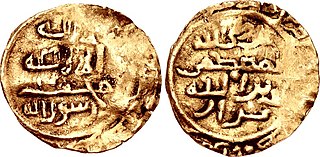
Alamut is a ruined mountain fortress located in the Alamut region in the South Caspian, near the village of Gazor Khan in Qazvin Province in Iran, approximately 200 km (130 mi) from present-day Tehran.

Hasan al-Sabbah also known as Hasan I of Alamut, was a religious and military leader, founder of the Nizari Ismai'li sect widely known as the Hashshashin or the Order of Assassins, as well as the Nizari Ismaili state, ruling from 1090 to 1124 AD.

Nizari Isma'ilism are the largest segment of the Ismaili Muslims, who are the second-largest branch of Shia Islam after the Twelvers. Nizari teachings emphasize independent reasoning or ijtihad; pluralism—the acceptance of racial, ethnic, cultural and inter-religious differences; and social justice. Nizaris, along with Twelvers, adhere to the Jaʽfari school of jurisprudence. The Aga Khan, currently Aga Khan IV, is the spiritual leader and Imam of the Nizaris. The global seat of the Ismaili Imamate is in Lisbon, Portugal.
An assassin is a person who commits targeted murder.
Manhunter or Man Hunter may refer to:
The Brothers may refer to:
Old man, Old Man or The Old Man may refer to:
A hitman is an assassin involved in contract killing.
Chapter One usually refers to a first chapter in a book.
Rashid al-Din Sinan also known as the Old Man of the Mountain, was an Arab Muslim missionary who served as the leader of the Nizari Ismaili state and the Order of Assassins from 1162 until his death in 1193. An adherent of Nizari Ismailism, a branch of Shia Islam, he was a prominent figure during the Crusades.

Masyaf Castle is a medieval structure in the town of Masyaf in Hama Governorate, Syria, situated in the Orontes Valley, approximately 40 kilometres to the west of Hama. It served to protect the approach to other Ismaili castles in the Syrian Coastal Mountain Range at a site controlling the trade routes to cities further inland such as Banyas. The castle itself stands on a platform about 20 metres above the surrounding plain. It became famous as the stronghold from which Rashid ad-Din Sinan, known as the Old Man of the Mountain, ruled from 1166-1193. He was a leader of the Syrian branch of the Shia Nizari Isma'ili sect, also known as the Assassins, and a figure in the history of the Crusades.

Ḥasan ʿAlā Zikrihi's-Salām or Hassan II was the hereditary Imam of the Nizari Isma'ilis of the Alamut Period from 1162 until 1166. From his capital of Alamut he ruled parts of Persia and Syria. His chief subordinate in Syria was Rashid ad-Din Sinan, the Old Man of the Mountain.

The Nizari state was a Nizari Isma'ili Shia state founded by Hassan-i Sabbah after he took control of the Alamut Castle in 1090 AD, which marked the beginning of an era of Ismailism known as the "Alamut period". Their people were also known as the Assassins or Hashashins.
League of Assassins is a fictional group of supervillains appearing in comic books published by DC Comics.
The surname Ajami or al-Ajami has origins in the Middle East and is prevalent in Arabic speaking countries. Derived from Ajam (عجم) it is an Arabic word meaning mute, which today refers to someone whose mother tongue is not Arabic.
Isma'ilism is a branch or sub-sect of Shia Islam.
Canopener or can opener, may refer to:
This page is based on this
Wikipedia article Text is available under the
CC BY-SA 4.0 license; additional terms may apply.
Images, videos and audio are available under their respective licenses.





